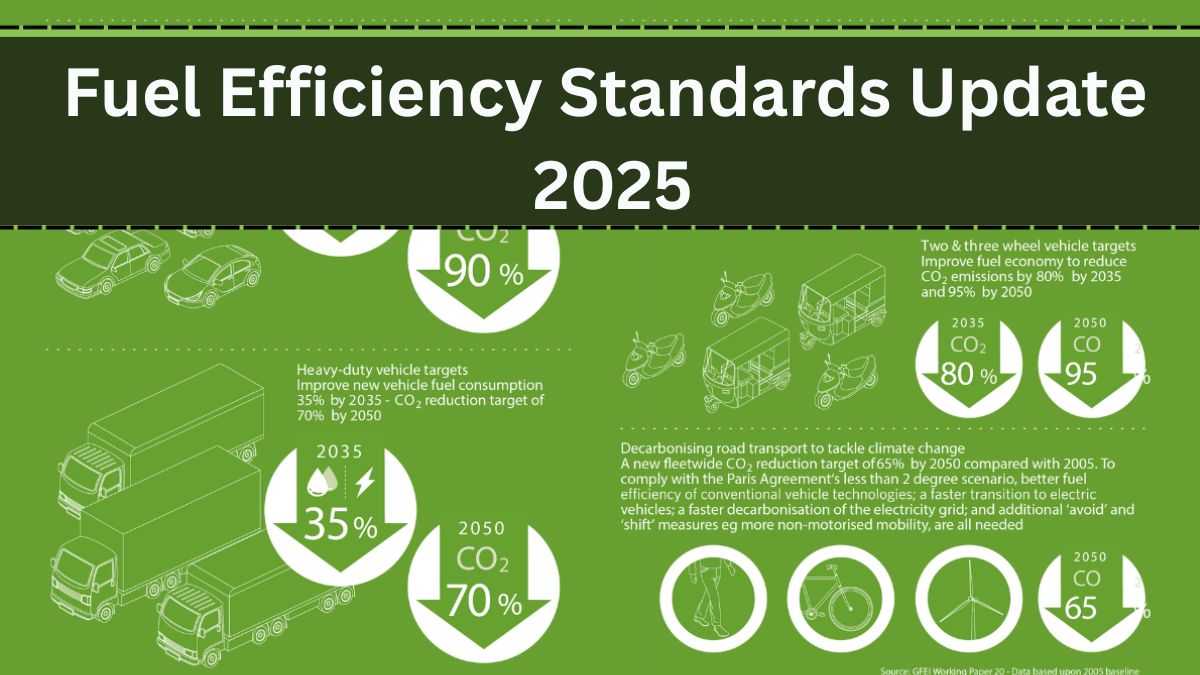The Fuel Efficiency Standards 2025 Update represents a major move towards cleaner mobility. With tighter government standards, automakers and car buyers will see significant changes aimed at enhancing car fuel efficiency and strengthening emission control measures.

What Are the New Fuel Efficiency Standards?
The Fuel Efficiency Standards 2025 Update introduces more ambitious targets for lowering carbon emissions and fuel consumption across car manufacturers’ fleets.
Key Highlights
-
Automakers must reduce average CO2 emissions across their vehicle lineup.
-
New models are required to achieve improved car fuel efficiency.
-
Greater reliance on advanced emission control technologies such as hybrid systems and upgraded catalytic converters.
Impact on Car Buyers
Here’s how the Fuel Efficiency Standards 2025 Update will shape your car-buying decisions.
| Aspect | Impact on Buyers |
|---|---|
| Car choices | More hybrid, electric, and fuel-efficient petrol/diesel options |
| Running costs | Lower fuel expenses thanks to better car fuel efficiency |
| Purchase price | Slightly higher initial costs as cleaner technology is adopted |
| Long-term savings | Reduced fuel consumption and potential tax incentives on cleaner cars |
Why Are These Standards Important?
These stricter government standards aim to:
-
Cut greenhouse gas emissions nationwide
-
Promote innovation in emission control and fuel-saving technologies
-
Reduce dependency on fossil fuels
-
Improve air quality, especially in urban areas
The Fuel Efficiency Standards 2025 Update helps align the auto sector with global climate goals.
How Are Car Makers Responding?
To meet these standards, automakers are:
-
Accelerating production of hybrid and electric vehicles
-
Re-engineering internal combustion engines for better car fuel efficiency
-
Incorporating lightweight materials to reduce energy consumption
-
Using smart systems like regenerative braking and idle stop-start features
Challenges Ahead
While the Fuel Efficiency Standards 2025 Update is a positive step, challenges include:
-
Managing production costs without significantly increasing car prices
-
Upgrading manufacturing facilities for new technologies
-
Educating customers on the advantages of fuel-efficient vehicles
FAQs
What is the main goal of the Fuel Efficiency Standards 2025 Update?
The main aim is to improve car fuel efficiency and reduce emissions by enforcing stricter government standards and boosting the use of advanced emission control systems.
Will cars cost more under these new standards?
Yes, cars might cost slightly more upfront due to the cost of cleaner technology. However, owners are likely to save on fuel and maintenance over time.
How will petrol and diesel vehicles be affected?
Petrol and diesel cars will need to meet tighter emission control norms, which will make them cleaner and more efficient. However, manufacturers may prioritize hybrids and EVs to meet fleet targets.
Are incentives available for cars that comply with the new standards?
Yes, buyers may qualify for tax rebates, discounts, or lower registration fees when purchasing vehicles that meet or exceed the updated government standards for emissions.
Click here to learn more